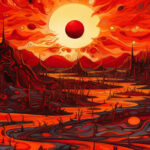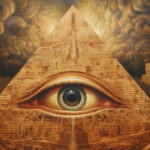Science fiction is a genre that has captured the imaginations of readers for centuries. From exploring the depths of the universe to examining the darkest aspects of the human psyche, classic sci-fi literature has played a significant role in shaping our understanding of the world around us. In this article, we will delve into the world of classic sci-fi literature and discover some of the best books of all time.

The Origins of Classic Sci-Fi Literature
Science fiction literature has a rich and fascinating history, with writers like Jules Verne and H.G Wells paving the way for the genre we know and love today. Their visionary works have inspired generations of readers and writers alike, and continue to captivate audiences to this day.
Early Influencers and Pioneers
Jules Verne is widely regarded as one of the earliest influencers of science fiction. His novels, such as “Journey to the Center of the Earth” and “Twenty Thousand Leagues Under the Sea,” presented futuristic visions of technology and machines that were far ahead of their time. Verne’s works were not only entertaining, but also sparked the imagination of readers, inspiring them to dream of what could be possible in the future.
Similarly, H.G Wells explored themes that were later to become synonymous with sci-fi – time travel and alien encounters. His novel “The Time Machine” introduced the concept of time travel to popular culture, while “The War of the Worlds” depicted a terrifying invasion by extraterrestrial beings. Wells’ works were groundbreaking in their exploration of scientific concepts and their impact on society, and set the stage for the emergence of science fiction as a genre.
The Emergence of Sci-Fi as a Genre
As the world changed, so did science fiction. It became more focused on the intersection between science and society, exploring the implications of technological advancements on humanity. In the early 20th century, writers like Isaac Asimov and Arthur C. Clarke began to explore new frontiers, making use of science to create believable and thought-provoking stories.
Asimov’s “Foundation” series, for example, imagined a future in which humans had colonized the galaxy and were governed by a complex system of mathematics and psychology. Clarke’s “2001: A Space Odyssey” explored the possibility of intelligent life beyond Earth, and the potential consequences of encountering it. These works, and many others like them, helped to establish science fiction as a genre that was not only entertaining, but also thought-provoking and socially relevant.
Today, science fiction continues to evolve and adapt to the changing world around us. From dystopian visions of the future to optimistic portrayals of human progress, the genre remains a rich and diverse landscape of ideas and imagination.
The Golden Age of Science Fiction
The 1940s and 1950s were considered the golden age of science fiction. Writers of this period differed from their predecessors in that they sought to create cohesive worlds with their own systems of rules and logic.
During this time, science fiction was not just a genre of literature, but a way of thinking about the world and the future. The atomic bomb had just been developed, and people were both fascinated and terrified by the possibilities of science and technology. Science fiction writers of the era tapped into this fear and excitement, creating stories that explored the possibilities of the future.
Defining Characteristics and Themes
Stories of this era tended to be optimistic and focused on the triumph of science and technology. They often explored themes of space exploration, time travel, and the possibility of life on other planets. These themes reflected the optimism of the era, as people looked to the stars and imagined a future where anything was possible.
However, not all science fiction of the era was optimistic. Some writers, such as Philip K. Dick, explored darker themes such as the dangers of technology and the potential for dystopian societies. These writers challenged the optimistic view of the future, asking readers to consider the consequences of unchecked scientific progress.
Iconic Authors and Their Works
During this period, many classic sci-fi novels were published, including works by iconic authors such as Ray Bradbury’s Fahrenheit 451, Robert A. Heinlein’s Stranger in a Strange Land, and Isaac Asimov’s Foundation trilogy. These works are still widely read and studied today, and have had a lasting impact on the science fiction genre.
Other notable authors of the era include Arthur C. Clarke, whose novel 2001: A Space Odyssey was later adapted into a groundbreaking film, and Ursula K. Le Guin, whose novel The Left Hand of Darkness explored themes of gender and sexuality in a way that was groundbreaking for its time.
Overall, the golden age of science fiction was a time of great creativity and imagination. The writers of this era pushed the boundaries of what was possible, both in terms of storytelling and scientific exploration. Their works continue to inspire and captivate readers today, and their influence can be seen in the science fiction of the present day.
Must-Read Classic Sci-Fi Novels
Science fiction has been a popular genre for centuries, captivating readers with stories of futuristic worlds, alien encounters, and technologies beyond our wildest dreams. From dystopian societies to space exploration, science fiction has something for everyone. Here are some of the must-read classic sci-fi novels that have stood the test of time.
Dystopian and Utopian Worlds
No discussion of classic sci-fi literature would be complete without mentioning dystopian and utopian worlds. These novels often presented a harsh world where humanity had reached its nadir. However, they also explored the possibility of a better world, one where humanity could thrive. George Orwell’s 1984 is a classic example of dystopian literature, depicting a world where personal freedom is non-existent, and the government controls every aspect of life. Aldous Huxley’s Brave New World takes a different approach, presenting a world where people are genetically engineered to fit into specific social classes. Yevgeny Zamyatin’s We is another classic dystopian novel, exploring a society where individuality is suppressed, and people are assigned numbers instead of names.
Space Exploration and Alien Encounters
When it comes to science fiction, space exploration and alien encounters are often at the forefront. These novels take readers on a journey to the stars, exploring new worlds and encountering strange life forms. Arthur C. Clarke’s 2001: A Space Odyssey is a classic example of this sub-genre, depicting a crew’s journey to Jupiter to investigate a mysterious monolith. H.G. Wells’s The War of the Worlds is another classic, depicting a Martian invasion of Earth. Frank Herbert’s Dune takes a different approach, exploring a desert planet where a young man named Paul Atreides must fight to reclaim his family’s throne.
Time Travel and Alternate Realities
Time travel and alternate realities have long been favorite themes of science fiction writers. These novels explore the possibility of changing the past or visiting a world that is different from our own. H.G Wells’s The Time Machine is a classic example of this sub-genre, taking readers on a journey to the year 802,701 AD. Kurt Vonnegut’s Slaughterhouse-Five explores the possibility of traveling through time and space, while Philip K. Dick’s The Man in the High Castle presents an alternate reality where the Axis powers won World War II.
Artificial Intelligence and Robotics
Artificial intelligence and the advent of robotics have inspired many science fiction writers to explore the possibilities of a future where technology has taken over. These novels explore the possibility of a world where robots have surpassed humans in intelligence and power. Isaac Asimov’s I, Robot is a classic example of this sub-genre, exploring the relationship between humans and robots. William Gibson’s Neuromancer takes a different approach, depicting a world where technology has merged with the human body. Philip K. Dick’s Do Androids Dream of Electric Sheep? explores the possibility of a world where androids are so lifelike that it is difficult to tell them apart from humans.
The Impact of Classic Sci-Fi on Modern Culture
Science fiction has been a popular genre for many years, captivating audiences with its imaginative concepts and futuristic worlds. Classic science fiction works have had a significant impact on modern culture, inspiring films, television shows, literature, and music.
Film and Television Adaptations
Many classic sci-fi novels have been adapted into films and television shows, some with great success. These adaptations have introduced these classic works to new audiences and helped to cement their place in popular culture.
One of the most notable adaptations is Blade Runner, directed by Ridley Scott and based on Philip K. Dick’s Do Androids Dream of Electric Sheep?. The film explores themes of artificial intelligence, identity, and what it means to be human. It has become a cult classic and has influenced many other films and television shows in the genre.
Another influential adaptation is The Matrix, directed by the Wachowskis and inspired by a variety of sci-fi works. The film explores the concept of a simulated reality and has had a significant impact on popular culture, inspiring countless imitations and parodies.
Influences on Contemporary Sci-Fi Literature
Many contemporary science fiction writers cite classic sci-fi literature as a major influence on their work. These works have helped shape the genre and make it more accessible to a wider audience, inspiring writers and readers alike.
One of the most notable examples is the work of author Isaac Asimov. His Foundation series, which explores the concept of psychohistory – a mathematical model for predicting the future – has had a significant impact on the genre. Asimov’s work has inspired countless other writers and helped to shape the science fiction genre as we know it today.
The Legacy of Classic Sci-Fi in Popular Culture
Classic sci-fi literature has left an indelible mark on popular culture. These works have inspired countless films, television shows, and other works of fiction, and have helped to shape the genre as we know it today.
One of the most iconic examples is Star Wars, which draws heavily on classic sci-fi tropes and themes. The franchise has become a cultural phenomenon, inspiring countless imitations and parodies, and has had a significant impact on popular culture.
Classic sci-fi works have also had an impact on music, inspiring countless songs and albums. Bands like Rush, Pink Floyd, and David Bowie have all drawn inspiration from science fiction in their music, helping to cement the genre’s place in popular culture.
In conclusion, classic sci-fi literature has had a significant impact on modern culture, inspiring countless adaptations, influencing contemporary writers, and leaving an indelible mark on popular culture. These works will continue to captivate audiences for generations to come.
- The 11 Best Books About Cats You Should Read - January 16, 2024
- The 9 Best Books on Building Confidence - January 16, 2024
- Discover the 10 Best Books on the Brain - January 16, 2024



